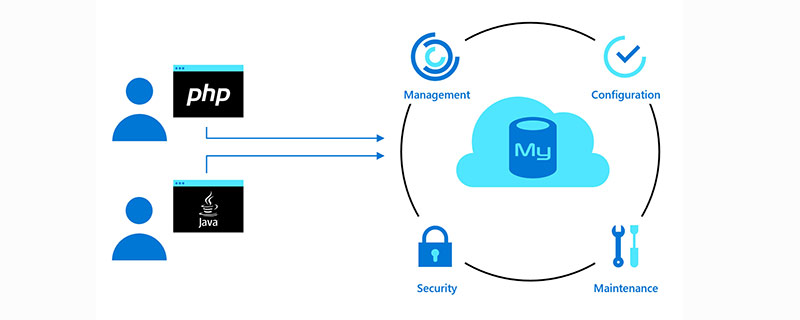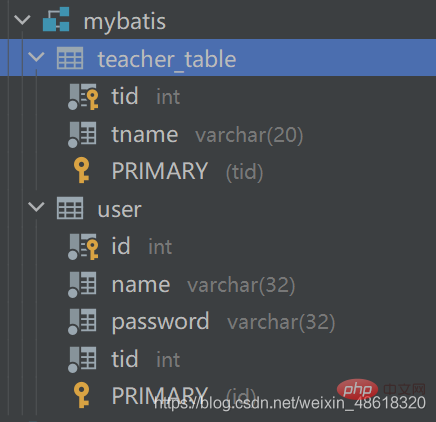
免費(fèi)學(xué)習(xí)推薦:mysql視頻教程
mybatis-config.xml詳細(xì)配置(配置時(shí)要把多余的屬性刪除 不能有中文 否則報(bào)錯(cuò)!)
<?xml version="1.0" encoding="UTF-8" ?><!DOCTYPE configuration PUBLIC "-//mybatis.org//DTD Config 3.0//EN" "http://mybatis.org/dtd/mybatis-3-config.dtd"><!--configuration核心配置 配置文件的根元素 --><configuration> <!-- 屬性:定義配置外在化 --> <properties></properties> <!-- 設(shè)置:定義mybatis的一些全局性設(shè)置 --> <settings> <!-- 具體的參數(shù)名和參數(shù)值 --> <setting name="" value=""/> </settings> <!-- 類型名稱:為一些類定義別名 --> <typeAliases> <!-- 實(shí)體類少 建議 第一種取別名方式--> <typeAlias type="包路徑" alias="別名"></typeAlias> <!--實(shí)體類多 建議 第二種取別名方式 默認(rèn)情況下用這種方式 別名為類名 首字母最好小寫 --> <package name="包名"/> </typeAliases> <!-- 類型處理器:定義Java類型與數(shù)據(jù)庫(kù)中的數(shù)據(jù)類型之間的轉(zhuǎn)換關(guān)系 --> <typeHandlers></typeHandlers> <!-- 對(duì)象工廠 --> <objectFactory type=""></objectFactory> <!-- 插件:mybatis的插件,插件可以修改mybatis的內(nèi)部運(yùn)行規(guī)則 --> <plugins> <plugin interceptor=""></plugin> </plugins> <!-- 環(huán)境:配置mybatis的環(huán)境 --> <environments default="development"> <!-- 環(huán)境變量:可以配置多個(gè)環(huán)境變量,比如使用多數(shù)據(jù)源時(shí),就需要配置多個(gè)環(huán)境變量 --> <environment id="development"> <!-- 事務(wù)管理器 --> <transactionManager type="JDBC"/> <!-- 數(shù)據(jù)源 配置連接我的數(shù)據(jù)庫(kù)--> <dataSource type="POOLED"> <property name="driver" value="com.mysql.jdbc.Driver"/> <property name="url" value="jdbc:mysql://localhost:3306/mybatis?serverTimezone=GMT%2B8&useSSL=true&useUnicode=true&characterEncoding=UTF-8"/> <property name="password" value="123"/> <property name="username" value="root"/> </dataSource> </environment> </environments> <!-- 數(shù)據(jù)庫(kù)廠商標(biāo)識(shí) --> <databaseIdProvider type=""></databaseIdProvider> <!-- 映射器:指定映射文件或者映射類 --> <mappers> <mapper resource="com/kang/w/dao/impl/UserMapper.xml"></mapper> </mappers></configuration>
分頁(yè)
減少數(shù)據(jù)訪問(wèn)量
limt實(shí)現(xiàn)分頁(yè)
sql語(yǔ)句: select * from 表名 limt 0,5;
- 0:數(shù)據(jù)開(kāi)始的位置
- 5:數(shù)據(jù)的長(zhǎng)度
第一種:使用Mybatis
1接口
List<User> getUserByLimit(Map<String, Object> map);
2mapeer.xml
<select id="getUserByLimit" parameterType="map" resultType="user"> select * from mybatis.user limit ${starIndex},${pageSize} </select>
2-1結(jié)果集映射
<resultMap id="map" type="User"> <result property="pwd" column="password"></result> </resultMap>
3測(cè)試
@Test public void getUserByLimitTest() { SqlSession sqlSession = MyBatisUtils.getSqlSession (); UserMapper mapper = sqlSession.getMapper (UserMapper.class); HashMap hashMap = new HashMap<String, Object> (); hashMap.put ("starIndex", 1); hashMap.put ("pageSize", 2); List userByLimit = mapper.getUserByLimit (hashMap); for (Object o : userByLimit) { System.out.println (o); } sqlSession.close (); }
第二種:使用RowBounds方法
1.接口
List getUserList();
2.實(shí)現(xiàn)接口
<select id="getUserList" resultType="user"> select * from mybatis.user </select>
3.測(cè)試:
/** * 測(cè)試使用RowBounds實(shí)現(xiàn)分頁(yè) */@Test public void getUserByLimitRowBoundsTest() { SqlSession sqlSession = MyBatisUtils.getSqlSession (); RowBounds rowBounds = new RowBounds (0, 2); List<User> userList = sqlSession.selectList ("com.kuang.w.dao.UserMapper.getUserList", null, rowBounds); for (User user : userList) { System.out.println (user); } //關(guān)閉 sqlSession.close (); }
第三種:使用Mybatis的分頁(yè)插件 pageHeIper
sql 多對(duì)一處理
數(shù)據(jù)庫(kù) :
pojo
數(shù)據(jù)庫(kù)中teacher-table表 對(duì)應(yīng)實(shí)體類 Teacher
package com.kuang.w.pojo; import lombok.Data; /** * @author W */ @Data public class Teacher { private int tId; private String tName; }
數(shù)據(jù)庫(kù)中user表 對(duì)應(yīng) 實(shí)體類Student
package com.kuang.w.pojo;import lombok.Data;/** * @author W */@Datapublic class Student { private int id; private int tid; private String name; private String password; private Teacher teacher;}
1.接口
List<Student> getStudentList();
2.xml配置實(shí)現(xiàn)接口
<!-- 多對(duì)一查詢 1 子查詢 mysql 通過(guò)一個(gè)表里是數(shù)據(jù) 與另一個(gè)表的一個(gè)數(shù)據(jù)相的情況下 查詢另一個(gè)的數(shù)據(jù) 一起顯示 --> <select id="getStudentList" resultMap="studentTeacher"> select * from mybatis.user; </select> <resultMap id="studentTeacher" type="Student"> <!-- 復(fù)雜屬性 對(duì)象用 :association 集合用:collection--> <!--column 數(shù)據(jù)庫(kù)中的字段 property 實(shí)體類中的屬性--> <result property="id" column="id"/> <result property="name" column="name"/> <result property="password" column="password"/> <!--javaType 一個(gè) Java 類的全限定名 ,或一個(gè)類型別名(關(guān)于內(nèi)置的類型別名,可以參考上面的表格)。 如果你映射到一個(gè) JavaBean,MyBatis 通常可以推斷類型。 然而,如果你映射到的是 HashMap, 那么你應(yīng)該明確地指定 javaType 來(lái)保證行為與期望的相一致。--> <association property="teacher" column="tid" javaType="Teacher" select="getTeacher"></association> </resultMap> <select id="getTeacher" resultType="Teacher"> select * from mybatis.teacher_table where tid = #{id}; </select>
<!--2 多表聯(lián)查--> <select id="getStudentList" resultMap="StudentList"> select u.id uid, u.name uname, u.password upassword, u.tid utid, t.tname from mybatis.user u, mybatis.teacher_table t where t.tid = u.tid; </select> <!-- 映射--> <resultMap id="StudentList" type="Student"> <result column="uid" property="id"/> <result column="utid" property="tid"/> <result column="uname" property="name"/> <result column="upassword" property="password"/> <association property="teacher" javaType="Teacher"> <result property="tName" column="tname"></result> </association> </resultMap>
mybatis-config.xm配置
<?xml version="1.0" encoding="UTF8" ?><!DOCTYPE configuration PUBLIC "-//mybatis.org//DTD Config 3.0//EN" "http://mybatis.org/dtd/mybatis-3-config.dtd"><configuration> <properties resource="db.properties"/> <settings> <setting name="logImpl" value="STDOUT_LOGGING"/> </settings> <typeAliases> <typeAlias type="com.kuang.w.pojo.Teacher" alias="teacher"/> <typeAlias type="com.kuang.w.pojo.Student" alias="student"/> </typeAliases> <environments default="development"> <environment id="development"> <transactionManager type="JDBC"/> <dataSource type="POOLED"> <property name="driver" value="${driver}"/> <property name="url" value="${url}"/> <property name="password" value="${password}"/> <property name="username" value="${username}"/> </dataSource> </environment> </environments> <mappers> <!-- <mapper resource="com/kuang/w/dao/TeacherMapper.xml"></mapper> <mapper resource="com/kuang/w/dao/StudentMapper.xml"></mapper>--> <mapper class="com.kuang.w.dao.StudentMapper"></mapper> <mapper class="com.kuang.w.dao.TeacherMapper"></mapper> </mappers></configuration>
3 測(cè)試
@Test public void getStudentListTest() { SqlSession sqlSession = MyBatisUtils.getSqlSession (); StudentMapper mapper = sqlSession.getMapper (StudentMapper.class); List<Student> studentList = mapper.getStudentList (); for (Student student : studentList) { System.out.println (student); } sqlSession.commit (); sqlSession.close (); }
sql 一對(duì)多處理
數(shù)據(jù)表結(jié)構(gòu) 對(duì)應(yīng)的實(shí)體類 不變
第一種方式: 多表聯(lián)查
1接口
List<Teacher> getTeacher(int tid);
2.1 xml實(shí)現(xiàn)接口
<select id="getTeacher" resultMap="TeacherStudent"> select t.tid, t.tname, u.id, u.name, u.password from mybatis.user u, mybatis.teacher_table t where t.tid = u.tid and t.tid = #{tid}; </select>
2.2映射配置
<resultMap id="TeacherStudent" type="Teacher"> <result property="tName" column="tname"/> <result property="tId" column="tid"/> <!-- 復(fù)雜屬性 對(duì)象用 :association 集合用:collection--> <collection property="students" ofType="Student"> <!--javaType 指定屬性類型 一個(gè) Java 類的全限定名--> <result column="id" property="id"></result> <result column="name" property="name"></result> <result column="password" property="password"></result> <result column="tid" property="tid"></result> </collection> </resultMap>
3測(cè)試
/*測(cè)試一對(duì)多*/ @Test public void getTeacherTest2() { SqlSession sqlSession = MyBatisUtils.getSqlSession (); TeacherMapper mapper = sqlSession.getMapper (TeacherMapper.class); List<Teacher> teacher = mapper.getTeacher (1); for (Teacher teacher1 : teacher) { System.out.println (teacher1); } //提交事務(wù) 架子 這里可以不要 sqlSession.commit (); // 關(guān)閉 sqlSession.close (); }
結(jié)果
com.intellij.rt.junit.JUnitStarter -ideVersion5 -junit4 com.kuang.w.dao.myTest,getTeacherTest2 Logging initialized using 'class org.apache.ibatis.logging.stdout.StdOutImpl' adapter.PooledDataSource forcefully closed/removed all connections.PooledDataSource forcefully closed/removed all connections.PooledDataSource forcefully closed/removed all connections.PooledDataSource forcefully closed/removed all connections.Opening JDBC Connection Created connection 164974746.Setting autocommit to false on JDBC Connection [com.mysql.cj.jdbc.ConnectionImpl@9d5509a]==> Preparing: select t.tid, t.tname, u.id, u.name, u.password from mybatis.user u, mybatis.teacher_table t where t.tid = u.tid and t.tid = ?; ==> Parameters: 1(Integer)<== Columns: tid, tname, id, name, password<== Row: 1, 狂神, 1, 天王蓋地虎, 111<== Row: 1, 狂神, 2, 小波, 123<== Row: 1, 狂神, 3, 雷神, 922<== Row: 1, 狂神, 5, 馬兒扎哈, 123<== Total: 4Teacher(tId=1, tName=狂神, students=[Student(id=1, tid=1, name=天王蓋地虎, password=111), Student(id=2, tid=1, name=小波, password=123), Student(id=3, tid=1, name=雷神, password=922), Student(id=5, tid=1, name=馬兒扎哈, password=123)])Resetting autocommit to true on JDBC Connection [com.mysql.cj.jdbc.ConnectionImpl@9d5509a]Closing JDBC Connection [com.mysql.cj.jdbc.ConnectionImpl@9d5509a]Returned connection 164974746 to pool.Process finished with exit code 0
第二種方式: 子查詢
1接口
List<Teacher> getTeacher(int tid);
2 實(shí)現(xiàn)接口
<!--第二種方式: 子查詢--> <select id="getTeacher3" resultMap="TeacherStudent3"> select * from mybatis.teacher_table where tid = #{tid}; </select> <resultMap id="TeacherStudent3" type="Teacher"> <!-- 復(fù)雜屬性 對(duì)象用 :association 集合用:collection 我們需要單獨(dú)處理對(duì)象: association 集合: collection javaType=""指定屬性的類型! 集合中的泛型信息,我們使用ofType 獲取 --> <result column="tid" property="tId"/> <result column="tname" property="tName"/> <collection property="students" javaType="ArrayList" ofType="Student" select="getStudentByTeacherId" column="tid"> </collection> </resultMap> <select id="getStudentByTeacherId" resultType="Student"> select * from mybatis.user where tid = #{tid}; </select>
3測(cè)試 同上
。。。。
相關(guān)免費(fèi)學(xué)習(xí)推薦:mysql數(shù)據(jù)庫(kù)(視頻)
.jpg)















.png)
